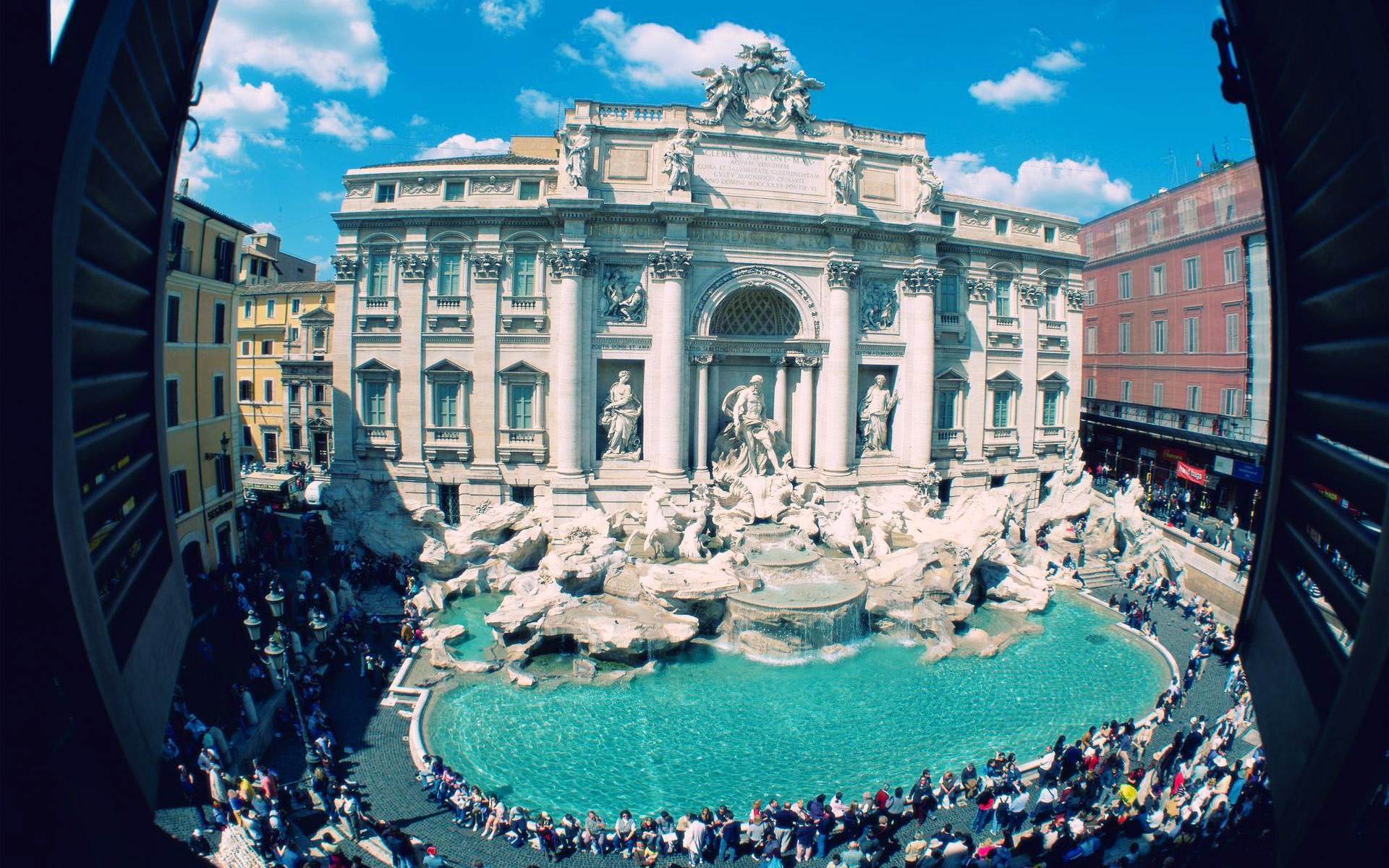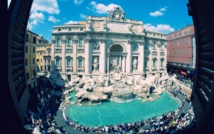Frustrated tourists have spent months peeking at bits of the monument from a special walkway put in over the fountain while repairs, funded by Italian fashion house Fendi, were carried out to the tune of over two million euros ($2.2 million).
The basin was drained but the most determined visitors had still been slinging coins over their shoulders -- a tradition that is said to ensure a return to Rome -- in the hope of getting them into a small substitute pool.
As the water cascaded once more from the base of the fountain's sea-god scene, a hail of coins plopped into the refilled basin as the Italian house's designer Silvia Venturini Fendi looked on.
Now the fountain, made famous by a scene in Federico Fellini's "La Dolce Vita" in which Anita Ekberg wades through its pristine waters, makes the surrounding buildings in Rome's historic centre look decidedly shabby.
"It's very emotional, especially for us Romans," Fendi said, after the company's CEO Pietro Beccari announced that the fashion house would fund the restoration of four other fountains in the Italian capital in a "gesture of love" for Rome.
More than 100 new LED lamps were installed to better illuminate the details of the fountain's centrepiece, while the plumbing was replaced to ensure the water's pH level will be maintained to protect the marble.
- Virgin waters -
The nearly 300-year-old monument, visited by millions of tourists every year, hit the headlines in 2012 after bits of its elaborate cornice began falling off following a particularly harsh winter.
Emergency repairs cost 320,000 euros, and a survey of the monument found that more critical work was needed, prompting a cash-strapped city hall to appeal to large companies and donors for funding. Fendi answered the call.
The company, founded as a leather goods business in Rome in the 1920s and now part of French luxury giant LVMH, signed up to a deal that allows it to hang a plaque near the monument for four years.
It also funded the restoration of the Quattro Fontane -- the late Renaissance fountains that grace each corner of a busy intersection in the capital.
It is not the only fashion house to help shore up the Eternal City's ailing monuments: luxury jeweller Bulgari has begun cleaning up the famous Spanish Steps, while shoemaker Tod's is financing work at the Colosseum.
The Trevi Fountain, commissioned by Pope Clement XII in 1730, is the end point of one of the aqueducts that supplied ancient Rome with water. It was last restored 23 years ago.
The Acqua Vergine runs for a total of 20 kilometres (12 miles) and ends up in the fountain, where tourists can drink from a special tap tucked away at one side.
Legend has it the water source was discovered in 19 BC by thirsty Roman soldiers guided to the site by a young virgin -- hence the name, Virgin Waters.
The tradition of throwing coins into the fountain was made famous by Frank Sinatra's rendition of "Three Coins in the Fountain" in the 1954 romantic comedy film of the same name.
------------------------------------------------------------------------------------------------------
The basin was drained but the most determined visitors had still been slinging coins over their shoulders -- a tradition that is said to ensure a return to Rome -- in the hope of getting them into a small substitute pool.
As the water cascaded once more from the base of the fountain's sea-god scene, a hail of coins plopped into the refilled basin as the Italian house's designer Silvia Venturini Fendi looked on.
Now the fountain, made famous by a scene in Federico Fellini's "La Dolce Vita" in which Anita Ekberg wades through its pristine waters, makes the surrounding buildings in Rome's historic centre look decidedly shabby.
"It's very emotional, especially for us Romans," Fendi said, after the company's CEO Pietro Beccari announced that the fashion house would fund the restoration of four other fountains in the Italian capital in a "gesture of love" for Rome.
More than 100 new LED lamps were installed to better illuminate the details of the fountain's centrepiece, while the plumbing was replaced to ensure the water's pH level will be maintained to protect the marble.
- Virgin waters -
The nearly 300-year-old monument, visited by millions of tourists every year, hit the headlines in 2012 after bits of its elaborate cornice began falling off following a particularly harsh winter.
Emergency repairs cost 320,000 euros, and a survey of the monument found that more critical work was needed, prompting a cash-strapped city hall to appeal to large companies and donors for funding. Fendi answered the call.
The company, founded as a leather goods business in Rome in the 1920s and now part of French luxury giant LVMH, signed up to a deal that allows it to hang a plaque near the monument for four years.
It also funded the restoration of the Quattro Fontane -- the late Renaissance fountains that grace each corner of a busy intersection in the capital.
It is not the only fashion house to help shore up the Eternal City's ailing monuments: luxury jeweller Bulgari has begun cleaning up the famous Spanish Steps, while shoemaker Tod's is financing work at the Colosseum.
The Trevi Fountain, commissioned by Pope Clement XII in 1730, is the end point of one of the aqueducts that supplied ancient Rome with water. It was last restored 23 years ago.
The Acqua Vergine runs for a total of 20 kilometres (12 miles) and ends up in the fountain, where tourists can drink from a special tap tucked away at one side.
Legend has it the water source was discovered in 19 BC by thirsty Roman soldiers guided to the site by a young virgin -- hence the name, Virgin Waters.
The tradition of throwing coins into the fountain was made famous by Frank Sinatra's rendition of "Three Coins in the Fountain" in the 1954 romantic comedy film of the same name.
------------------------------------------------------------------------------------------------------









 Home
Home Politics
Politics











